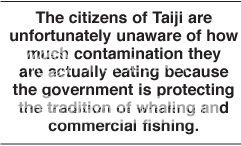For generations, the fishermen of the Taiji Cove located in Japan have been hunting whales and dolphins as food to be sold at the local markets. As the dolphins migrate, between January and March, the fishermen pound poles together in the water, scarring the dolphins and interfering with their echolocation. The frightened dolphins head toward the shallow cove, where other fishermen wait to slaughter them.
Recently, this matter of killing dolphins for food has come to light here in the United States. Animal rights activists have made it their duty to expose the dolphin hunt, referring to it as “a symbol of our utilitarian view of nature, that we can use and abuse the sea.” However, the problem with this argument that killing ocean animals for food is abusing our sea is that we as Americans do our part to destroy the planet. We can use dolphin hunting as a scapegoat when we stop dumping waste into the ocean. Even Hayden Panettiere got in on the protests with the Save the Dolphins organization, which was founded to promote awareness and help to stop the slaughtering of the dolphins. She stated that they were like teddy bears in the ocean.
In laymen terms, we should only fight for the rights of “cute” animals. If you can’t cuddle with it, play with it, or ride on it’s back, then it is ok to consume. So I suppose that means that only the ugly animals should be eaten, like squid and lobster.
I would consider myself to be an animal rights activist. I love animals, as many people do, and I am very much against cruelty and abuse. However, there is one matter that people are overlooking in this issue; culture. In Japan, people eat whales and dolphins.

In China and Korea, people have been known to eat dog. It is not a stereotype; it is just what they eat. In the United States, we eat cows, pig, chickens, lamb and a variety of other animals. In this case, we have taken it into our own hands to tell other cultures that what they’re doing is barbaric. But has anyone ever been to a slaughterhouse in the U.S.? Do animal rights activists believe that our method of slaughtering animals for our consumption is any less appalling?
To get the tender texture of veal, we cart up baby cows so that they cannot move and therefore gain no chewy muscle. How appropriate. One Japanese fisherman stated, “The killing is done in the open here, so it looks worse than it is.”
A valid argument against the dolphin hunt could be that because they are wild animals, they should not be eaten, even though we’ve been known to eat deer and a variety of other wildlife. The dolphins near the Taiji coast have high levels of mercury, resulting in numerous cases of mercury poisoning to the locals. A simple solution would be for the locals not to eat the meat, therefore obliterating the demand. No demand for dolphin meat equals no supply for dolphin meat.
The citizens of Taiji are unfortunately unaware of how much contamination they are actually eating because the government is protecting the tradition of whaling and commercial fishing. Also, the government wants to protect their reputation that mercury poisoning is threatening their nation. So what is the best way to make sure the whaling business in Taiji is thriving? Don’t let your citizens know that their delicious dolphin casserole is laced with 36 times the amount of mercury than the Health Ministries safe level allows.
The fishermen of Taiji are tired of having to justify what they are doing with the dolphins to the Americans who go over and interfere with their jobs. We don’t see people from India protesting our consumption of cow, their sacred animal. We are probably one of the only cultures who buy jewelry, strollers, and clothes for our pets so we can include them in our Christmas cards. That is not a bad thing, but we cannot expect other cultures to do the same.
If you have had a chance to see footage from the dolphin hunt, it is extremely depressing and dismal. I assume that any footage of an animal being slaughtered would be equally upsetting, but since we’ve all seen ‘Flipper’ and ‘Free Willy’, we are even more sensitive about eating cute animals that do flips for fish.
I am not saying, whatsoever, that I support the dolphin hunt in any way. To do my part, I have refused to eat any type of cetacean. The only point to be made here is that once again, we have taken it upon ourselves to determine what cultures are doing wrong, and how we are right.
Perhaps we can push other cultures to stop hunting dolphins when we stop eating baby sheep and cows. Until then, we have to hope that the Taiji government no longer wants to poison their citizens with mercury-plagued porpoises.





